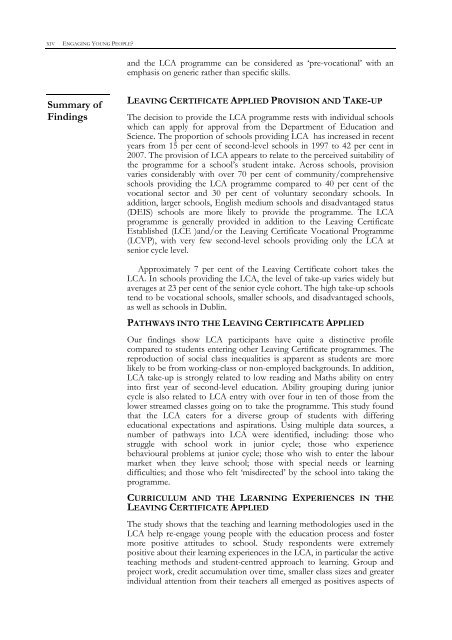Student Experiences of the Leaving Certificate Applied Programme
Student Experiences of the Leaving Certificate Applied Programme
Student Experiences of the Leaving Certificate Applied Programme
Create successful ePaper yourself
Turn your PDF publications into a flip-book with our unique Google optimized e-Paper software.
XIVENGAGING YOUNG PEOPLE?and <strong>the</strong> LCA programme can be considered as ‘pre-vocational’ with anemphasis on generic ra<strong>the</strong>r than specific skills.Summary <strong>of</strong>FindingsLEAVING CERTIFICATE APPLIED PROVISION AND TAKE-UPThe decision to provide <strong>the</strong> LCA programme rests with individual schoolswhich can apply for approval from <strong>the</strong> Department <strong>of</strong> Education andScience. The proportion <strong>of</strong> schools providing LCA has increased in recentyears from 15 per cent <strong>of</strong> second-level schools in 1997 to 42 per cent in2007. The provision <strong>of</strong> LCA appears to relate to <strong>the</strong> perceived suitability <strong>of</strong><strong>the</strong> programme for a school’s student intake. Across schools, provisionvaries considerably with over 70 per cent <strong>of</strong> community/comprehensiveschools providing <strong>the</strong> LCA programme compared to 40 per cent <strong>of</strong> <strong>the</strong>vocational sector and 30 per cent <strong>of</strong> voluntary secondary schools. Inaddition, larger schools, English medium schools and disadvantaged status(DEIS) schools are more likely to provide <strong>the</strong> programme. The LCAprogramme is generally provided in addition to <strong>the</strong> <strong>Leaving</strong> <strong>Certificate</strong>Established (LCE )and/or <strong>the</strong> <strong>Leaving</strong> <strong>Certificate</strong> Vocational <strong>Programme</strong>(LCVP), with very few second-level schools providing only <strong>the</strong> LCA atsenior cycle level.Approximately 7 per cent <strong>of</strong> <strong>the</strong> <strong>Leaving</strong> <strong>Certificate</strong> cohort takes <strong>the</strong>LCA. In schools providing <strong>the</strong> LCA, <strong>the</strong> level <strong>of</strong> take-up varies widely butaverages at 23 per cent <strong>of</strong> <strong>the</strong> senior cycle cohort. The high take-up schoolstend to be vocational schools, smaller schools, and disadvantaged schools,as well as schools in Dublin.PATHWAYS INTO THE LEAVING CERTIFICATE APPLIEDOur findings show LCA participants have quite a distinctive pr<strong>of</strong>ilecompared to students entering o<strong>the</strong>r <strong>Leaving</strong> <strong>Certificate</strong> programmes. Thereproduction <strong>of</strong> social class inequalities is apparent as students are morelikely to be from working-class or non-employed backgrounds. In addition,LCA take-up is strongly related to low reading and Maths ability on entryinto first year <strong>of</strong> second-level education. Ability grouping during juniorcycle is also related to LCA entry with over four in ten <strong>of</strong> those from <strong>the</strong>lower streamed classes going on to take <strong>the</strong> programme. This study foundthat <strong>the</strong> LCA caters for a diverse group <strong>of</strong> students with differingeducational expectations and aspirations. Using multiple data sources, anumber <strong>of</strong> pathways into LCA were identified, including: those whostruggle with school work in junior cycle; those who experiencebehavioural problems at junior cycle; those who wish to enter <strong>the</strong> labourmarket when <strong>the</strong>y leave school; those with special needs or learningdifficulties; and those who felt ‘misdirected’ by <strong>the</strong> school into taking <strong>the</strong>programme.CURRICULUM AND THE LEARNING EXPERIENCES IN THELEAVING CERTIFICATE APPLIEDThe study shows that <strong>the</strong> teaching and learning methodologies used in <strong>the</strong>LCA help re-engage young people with <strong>the</strong> education process and fostermore positive attitudes to school. Study respondents were extremelypositive about <strong>the</strong>ir learning experiences in <strong>the</strong> LCA, in particular <strong>the</strong> activeteaching methods and student-centred approach to learning. Group andproject work, credit accumulation over time, smaller class sizes and greaterindividual attention from <strong>the</strong>ir teachers all emerged as positives aspects <strong>of</strong>

















